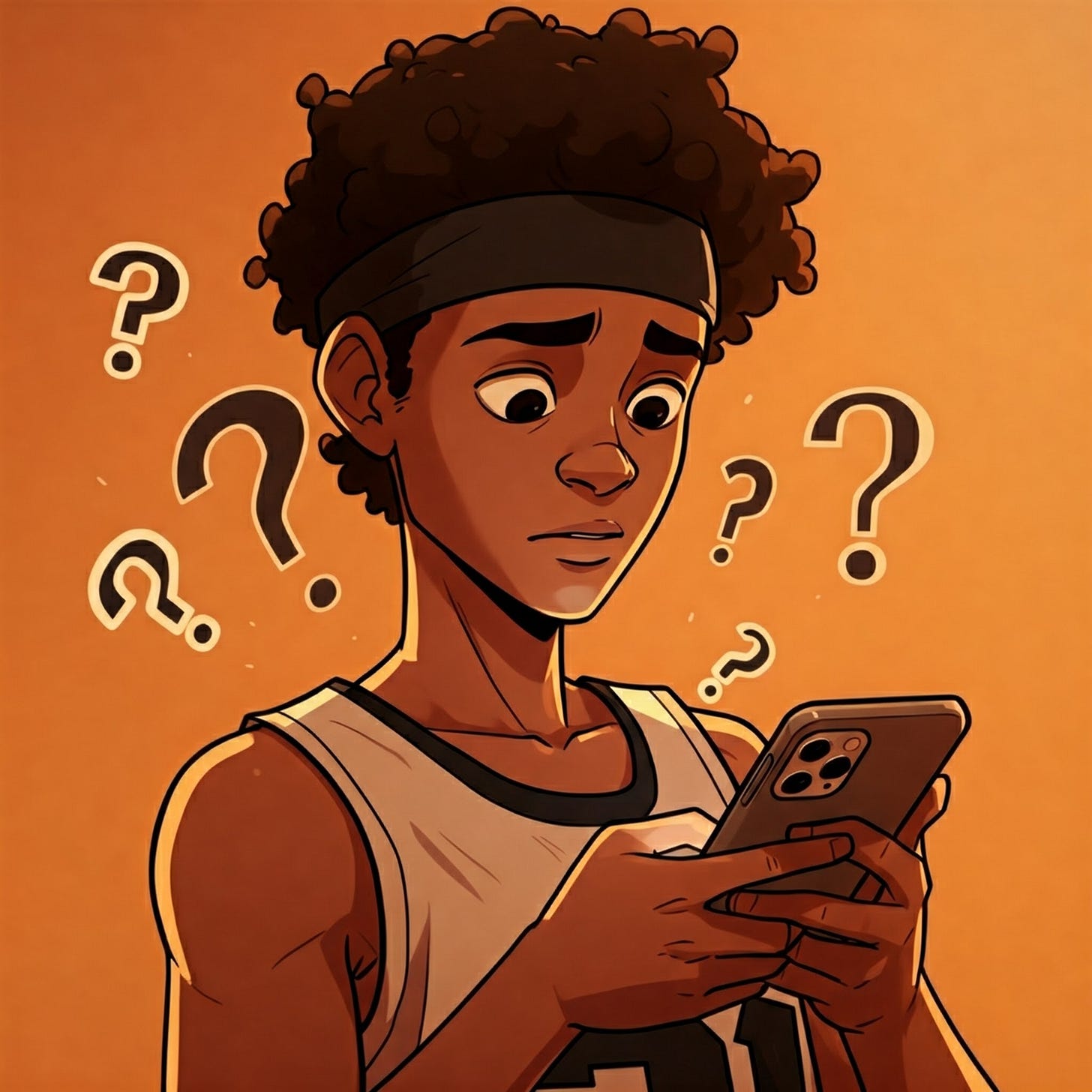What We’re Discussing In This Issue
The Opening Line From Jim and Jason.
A Special Message from former Big League Manager Clint Hurdle on the Power of Being Present
In the Spotlight: December - The Gift of Presence
The Reality Check: Distraction Nation
The Deep Dive: Why Presence Matters
The Toolbox: Unlocking the Power of Presence
Game-Changing Quote: Elevate Your Coaching with this Week's Wisdom
Champions of Change: Coach Johnson and the "Presence Pioneers"
The Joy of the Game: Keeping the Fun Alive with a Lesson from Lasso
The Opening Line From Jim and Jason
Coaches,
As the year comes to a close and the holiday season surrounds us, it's easy to get swept up in the whirlwind of activities and obligations. But amidst the chaos, we urge you to remember the power of the present moment. This month, let's explore how being truly present can transform your coaching and create a lasting impact on your athletes.
Ready to change the game? Let's do this together.
Not your thing? No hard feelings. Click unsubscribe at the bottom of the newsletter.
Keep fighting the good fight, Jim and Jason,
Jim & Jason
A Special Message from former Big League Manager Clint Hurdle on the Power of Being Present
In the chaos of youth sports, it's easy to get swept away by the current. Parents, coaches, athletes – we're all caught up in the hustle. But the real game-changer? Being present.
Being present means being where your feet are. It's about tuning out the noise and focusing on the here and now. When you're truly present, you connect with your athletes on a deeper level. You see them, you hear them, you understand them.
Presence creates trust, fosters growth, and builds a winning culture. So, take a breath, ditch the distractions, and be present. It's the most valuable play you can make."
Click here to listen to Clint's blueprint on how to build champions in Youth Sports!
In the Spotlight: December - The Gift of Presence
December, a month filled with festivities and the spirit of giving, presents a unique opportunity for coaches to offer their athletes a truly invaluable gift: the gift of presence. In the often intense and demanding world of youth sports, where the scoreboard often overshadows the individual, the act of being truly present can be a game-changer.
Being present transcends merely showing up physically; it's about tuning in wholeheartedly, setting aside distractions, and engaging with your athletes on a deeper level. It's about:
Truly seeing them: Observing not just their physical performance, but also their emotional state, their body language, and their unspoken cues. Are they excited, anxious, frustrated?
Hearing their concerns: Creating a safe space for open communication where athletes feel comfortable expressing their thoughts and feelings without fear of judgment. Actively listening to their concerns, whether they're related to the game, school, or their personal lives.
Understanding their needs: Recognizing that each athlete is unique, with different strengths, weaknesses, and motivations. Taking the time to understand their individual needs and tailoring your coaching approach accordingly.
Being present means putting down your phone, silencing the mental chatter of to-do lists and game strategies, and immersing yourself fully in the moment. It's about fostering an environment where athletes feel valued, supported, and understood, not just as players, but as individuals. This December, let's commit to giving our athletes the gift of our undivided attention, a gift that will empower them both in and out of sports.
The Reality Check: Distraction Nation
We live in a world of constant distractions. From the buzzing of our phones to the endless to-do lists, it's easier than ever to be physically present but mentally miles away. And this distraction epidemic is taking a toll on our young athletes.
Research paints a stark picture of the consequences:
Decreased Performance: A 2022 study published in the Journal of Sport and Exercise Psychology found that athletes whose coaches were frequently distracted during practice exhibited slower reaction times and decreased accuracy in skill execution.
Increased Anxiety: A survey conducted by the Youth Sports Institute in 2023 revealed that 68% of young athletes felt their coaches were often distracted during practice or games. Of those athletes, 72% reported experiencing moderate to high levels of anxiety related to their sport.
Lowered Motivation: A 2024 study published in Psychology of Sport and Exercise found a direct correlation between coach presence and athlete motivation. Athletes who perceived their coaches as being more present reported higher levels of intrinsic motivation and a greater sense of enjoyment in their sport.
The numbers don't lie: distraction is detrimental to the mental, emotional, and even physical well-being of our young athletes. It erodes trust, hinders development, and diminishes the joy of the game.
The Deep Dive: Why Presence Matters
Think back to a time when you felt truly seen and heard, maybe by a mentor, a teacher, or a loved one. Remember that feeling of validation, of belonging, of knowing that your thoughts and feelings mattered. That's the power of presence, and it's rooted in our very biology.
Our brains are wired for connection. When we experience genuine connection, our brains release oxytocin, often called the "love hormone" or "cuddle chemical." Oxytocin fosters feelings of trust, safety, and reduces stress. It's the biological foundation of secure relationships and emotional well-being.
Now, imagine the impact this has on a young athlete. When a coach is present, truly present, it triggers this cascade of positive neurochemicals in the athlete's brain. They feel safe, valued, and understood. This sense of security allows them to:
Take Risks: Knowing their coach believes in them, they're more willing to step outside their comfort zone, try new skills, and push their limits.
Cope with Setbacks: When they stumble or make a mistake, they know their coach isn't judging them, but rather supporting them through the learning process. This fosters resilience in sports, enabling them to bounce back from challenges stronger than before.
Develop Intrinsic Motivation: Feeling connected to their coach and teammates fuels their inner drive, making them want to play for the love of the game, not just for external rewards or approval.
On the flip side, when coaches are distracted or disengaged, it triggers the opposite effect. Athletes feel ignored, unimportant, and insecure. This activates stress responses, leading to anxiety, decreased performance, and even potential burnout.
Coaches, your presence is more than just a coaching technique; it's a biological imperative. It's the key to unlocking your athletes' full potential, not just as players, but as resilient, confident individuals.
The Toolbox: Unlocking the Power of Presence
Ready to tap into the transformative power of presence? It's time to trade in distractions for focused attention and create a coaching environment where your athletes truly feel seen, heard, and valued. Here's your action plan:
1. Master the "Mindful Minute":
Hurdle's Hint: Clint Hurdle, known for his mindful leadership, would likely emphasize the importance of creating a focused mindset before interacting with his players.
Coach's Play: Before each practice or game, carve out a "Mindful Minute." Find a quiet spot, close your eyes, and take a few deep breaths. Visualize yourself fully present with your athletes, offering your undivided attention and genuine connection.
2. Establish "No-Phone Zones":
Hurdle's Focus: Hurdle would likely advocate for minimizing distractions to create a space where players feel valued and heard.
Coach's Play: Designate specific times and spaces as "No-Phone Zones." During practices, team meetings, and individual conversations, put your phone away – out of sight, out of mind. This sends a powerful message to your athletes that they are your top priority.
3. Engage in "Active Listening":
Hurdle's Heart-to-Heart: Known for his empathetic communication style, Hurdle would likely stress the importance of truly listening to understand his players' perspectives.
Coach's Play: Go beyond simply hearing your athletes; practice "Active Listening." Make eye contact, nod, and offer verbal cues like "I understand" or "Tell me more." Ask clarifying questions to demonstrate your genuine interest and engagement.
4. Utilize "Body Language Intelligence":
Hurdle's Presence: Hurdle, a charismatic leader, understands the importance of nonverbal communication in building rapport and trust.
Coach's Play: Be mindful of your own body language. Are you open and approachable, or do you appear closed off and distant? Ensure your nonverbal cues are congruent with your intention to be present and attentive.
5. Practice the "Name Game":
Hurdle's Personal Touch: Hurdle, known for his ability to connect with players on a personal level, would likely emphasize the importance of remembering and using names.
Coach's Play: Make a conscious effort to use your athletes' names frequently. This simple act reinforces their individuality and shows that you see them as more than just players on a team.
By implementing these strategies, you'll create a coaching environment where presence thrives, empowering your athletes to reach their full potential and develop the mental toughness and leadership skills they need to succeed in sports and in life.
Team Activities for Coaches and Players for Cultivating Presence
Game-Changing Quote: Elevate Your Coaching with this Week's Wisdom
"We're all going to fall short. We're going to have some bumps in the road. But it's grace that picks us up and puts us back on the path. And that grace can come in different ways. Sometimes that grace comes from someone else, and sometimes that grace comes from within." - Clint Hurdle
Why we like it:
This quote resonates with the theme of presence because it highlights the importance of empathy, compassion, and understanding – qualities that are essential for coaches who want to truly connect with their athletes. Hurdle acknowledges that everyone makes mistakes and faces challenges, but emphasizes the power of grace, both from within and from others, to help us get back on track. This message encourages coaches to create a supportive environment where athletes feel safe to take risks, learn from their mistakes, and grow as individuals. It's a reminder that coaching is about more than just winning; it's about fostering resilience, self-compassion, and a growth mindset.
Three Ways to Implement Hurdle's Quote with Your Teams:
Champions of Change: Coach Johnson and the "Pioneer of Present" system aka “P.O.P.”
Coach Johnson, a youth baseball coach in a quiet suburb of Denver, noticed a troubling trend. His team, a group of 12-year-olds with undeniable potential, was losing its spark. Practices were lackluster, communication was strained, and negativity was creeping in. Despite their talent, they weren't playing as a cohesive unit. Coach Johnson knew he had to address the underlying issue: a lack of presence and connection.
Instead of resorting to traditional motivational tactics or disciplinary measures, Coach Johnson decided to try something different. He introduced the "Pioneer of Presence aka the P.O.P. Player," a rotating leadership role designed to empower players to cultivate presence within themselves and the team. Each week, the players nominated a teammate who demonstrated qualities like active listening, empathy, and supportive communication. Their role was to keep things popping at practice and during games.
The "Pioneer of Presence aka P.O.P. Player" wore a distinctive wristband during practices and games, serving as a tangible reminder for everyone to be mindful of their interactions and focus on the present moment. This simple act had a profound impact. Players started noticing and appreciating each other's efforts, offering encouragement instead of criticism, and truly listening to each other's perspectives.
The shift wasn't confined to the baseball diamond. Parents reported that their children were more engaged in family conversations, more aware of their own emotions, and more considerate of others. The players themselves expressed a renewed sense of camaraderie, a deeper understanding of themselves and their teammates, and a greater appreciation for the game.
Coach Johnson's experience illustrates the transformative power of presence in youth sports. By prioritizing connection and mindfulness, he not only revitalized his team's spirit but also equipped his players with invaluable life skills that extend far beyond the baseball field.
Click here to Implement the Pioneer of Presence "POP" in Your Program
The Joy of the Game: Keeping the Fun Alive with a Lesson from Lasso
A great way to build presence even after a tough loss… Ted Lasso does it again









